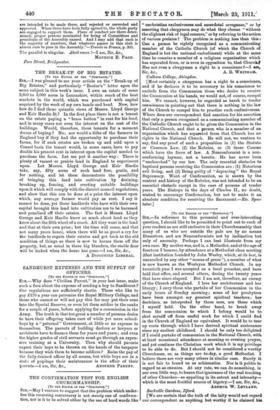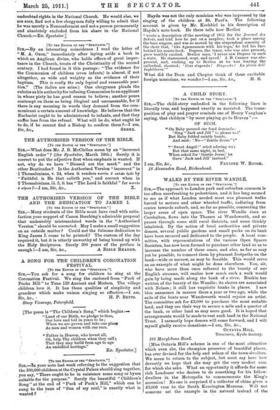[TO THE EDITOR OF THE " SPECTATOR."]
SIR, —In reference to this perennial and ever-interesting question, I should like to be permitted to point out to such of your readers as are still exclusive in their Cburchmanship that many of us who are outside the pale are by no means Dissenters, and are Nonconformists not by inclination but only of necessity. Perhaps I can best illustrate from -my own case. My mother was, and is, a Methodist, and at the age of fourteen I became, by attendance at a Methodist class meeting (that institution founded by John Wesley, which, at its best, is unexcelled by any other " means of grace "), a member of what is now known as the Wesleyan Methodist Church. In my twentieth year I was accepted as a local preacher, and have held that office, and several others, during the twenty years that have since elapsed. But I am not, therefore, an enemy of the Church of England. I love her architecture and her liturgy ; I envy those who partake of her Communion in the early hours of Sunday morning ; some of her presbyters have been amongst my greatest spiritual teachers ; her doctrines, as interpreted by these men, are those which I myself hold. On the other hand, to break away from the communion to which I belong would be to shut myself off from useful work for which I could find in the Church of England no equivalent. It would be to tear up roots through which I have derived spiritual sustenance since my earliest childhood. I should be only too delighted if I could partake of communion in the National Church, with at least occasional attendance at morning or evening prayer, and yet continue the Christian work which it is my privilege to be able to do. But I should not be considered a worthy Churchman, or, as things are to-day, a good Methodist. I believe there are very many others in similar case. Surely it is not fair to brand us as schismatics. Nor is it politic to regard us as enemies. At any rate, we can do something, in our own little way, to lessen that ignorance of the real teaching of other Churches—so appalling in its extent and intensity—. which is the most fruitful source of bigotry.—I am, Sir, &c.,
ARTHUR W. LEYLAND.
Backville Gardens, Ilford.
[We are certain that the bulk of the laity would not regard our correspondent as anything but worthy if he claimed his
undoubted rights in the National Church. He would also, we are sure, find not a few clergymen fully willing to admit that he was merely a Nonconformist and nota person permanently and absolutely excluded from his share in the National Church.—ED. Spectator.]











































 Previous page
Previous page